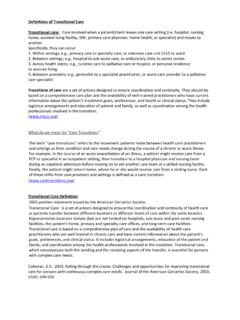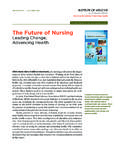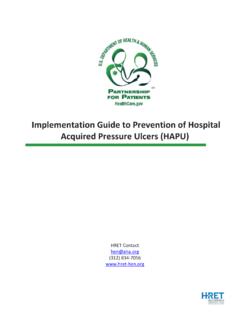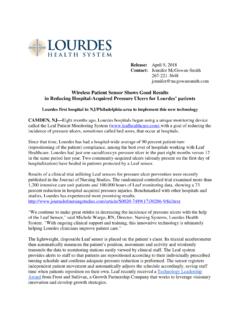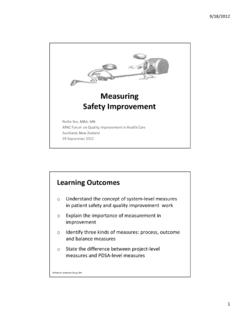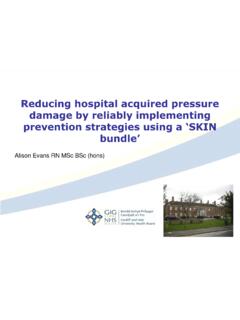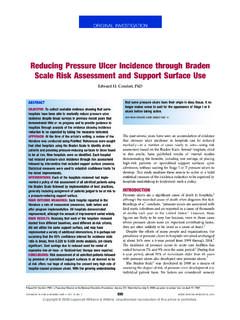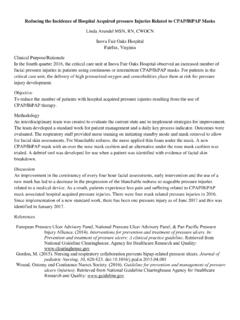Transcription of Impact of the Clinical Nurse Specialist Role on the …
1 Impact of the Clinical Nurse Specialist Role on the Costs and Quality of Health Care December, 2013. In 2010, the spent $ trillion on health care, an average of $8,402 per person. Implementation of the Affordable Care Act has begun and while the benefits and shortcomings of this law have been projected, the reality of implementation is before the nation. The Congressional Budget Office has estimated that more than 14 million more individuals will gain coverage either as a result of access to newly created health plans or as a result of an expansion of state Medicaid programs. The economic pressures and policy changes are causing a radical shift in health care delivery across the entire continuum of care. Within these major shifts of policy and care delivery models, it is essential that the patients who rely on the health care system have access to high quality, cost-effective care.
2 The nation's 72,000 Clinical Nurse specialists (CNS) are uniquely prepared with advanced nursing education to meet the increased demand for health care and to safeguard the provision of quality care. Since 1953, the CNS has served as a committed leader, delivering cost-effective care with optimal patient outcomes (Peplau, 2003). The CNS provides both health promotion and maintenance through assessment, diagnosis, and management of acute and chronic patient problems that includes pharmacologic and non-pharmacologic interventions. Research and demonstration projects have shown that the CNS role is uniquely suited to lead implementation of evidence-based quality improvement actions that also reduce cost throughout the health care system.
3 This leadership has been demonstrated in the following areas, but not limited to;. providing prenatal care, preventive and wellness care, behavioral health care and care to those with chronic conditions. The CNS also plays an essential role in care coordination and transitions of care that result in reduced hospital length of stay, fewer hospital readmissions and hospital - acquired conditions (HACs). A review of the CNS Core Competencies supports the centrality of the function of care coordination within the CNS. role. This would show that the CNS is educated and prepared to be, not only a participant in care coordination, but also to partner with other providers in the leadership role for care coordination. Improving Prenatal Care Clinical Nurse specialists have demonstrated improved outcomes when providing home care to mothers with a high risk of delivering low-birth weight infants and for early discharge of very low birth weight infants with follow-up.
4 Brooten, Youngblut, Brown, Finkler, Neff, & Madigan (2001) showed in a randomized, controlled Clinical trial that the group receiving prenatal home care by a CNS saved 750. hospital days, yielding $ million dollars saved. The CNS has also been shown to be an effective member of the prenatal care team and to have the greatest client satisfaction and the lowest cost per visit when providing prenatal care (Gravely 1992). 1. Preventive and Wellness Care reducing Overall Costs for Employer Clinical Nurse specialists improve access to wellness and preventive care by early identification of those at risk for costly chronic diseases, such as diabetes and heart failure and provide care to keep people healthy and prevent chronic conditions.
5 A wellness company, owned and managed by CNSs, provides ongoing care to employees to help them stay healthy and to lower their risk for the development of disease. An employer, who has engaged the services of these CNSs, saw their health care costs decrease and the annual increase in their health insurance premiums go to the single digits, as opposed to previous double digit increases (Dayhoff 2008). Psychiatric/Behavioral Health Care to Reduce Depression Clinical Nurse specialists provide behavioral health care to individuals in private practice and to communities through special programs. The Insight Program, which was implemented by CNSs in a community setting to address depression in women, had a statistically significant and clinically relevant improvement in scores on all tools used (Adams 2000).
6 Another study demonstrated that CNSs also work as members of the primary care team in providing care to improve the recognition of depression and its initial management in a Veterans Administration hospital (Dobscha 2001). reducing Costs of Chronic Condition Care Clinical Nurse specialists have distinguished themselves as effective coaches of those with chronic illness by promoting self-care and reducing the costs of the illness and readmissions. Several studies document their efforts in the care of the chronically ill, including those with heart failure (Creason 2001, Newman 2002, Knox 1999, Ryan 2009), asthma (Horner 2008) and epilepsy (McNellis 2007). In addition, CNSs have developed and demonstrated the effectiveness of their community programs that identify those with COPD early slowing down the progression of their disease (DeLong 2004).
7 Preventing hospital - acquired Conditions (HACs). Clinical Nurse specialists are the leaders in preventing hospital - acquired conditions (HACs). hospital acquired conditions (HACs) include pressure ulcers, falls, and infections such as: central line associated bloodstream infections (CLABSI) and catheter-associated urinary tract infections (CA-UTI). Preventing HACs is critical for improving the quality of care and reducing overall health care costs. Allain (2012) cites hospital - acquired pressure ulcers as affecting million people at a cost of $ billion annually. Another prevalent HAC, CLABSI, adds additional costs of $35,000 to $56,000 per case, which is no longer reimbursed by Medicare. (Lee, 2011). Numerous studies have documented the Impact the CNS has in preventing HACs in acute care settings.
8 Krupp (2009) demonstrated CNSs decreased the HAC rate by 46% in an acute care setting. Hays (2010) demonstrated a pressure ulcer treatment program, implemented by a CNS, decreased HAC rates from 20% down to , resulting in a cost savings of over $40,000 for that organization. 2. Richardson & Tjoelker (2012) demonstrated a CNS led initiative to decrease CLABSI saving the organization $214,712 in terms of cost avoidance and lives saved out of 8 patients with CLABSI. Maze (2011) also demonstrated a CNS led initiative resulting in the CLABSI rate to be consistently below the National Healthcare Safety Network (NHSN) benchmark. Multiple other studies have proven the CNS role as expert clinician, consultant & change-agent in the prevention of HACs, leading to cost savings for the organization (Lee, 2011, Krupp, 2009, Quinn, 2011, Morrison, 2010, Jones, 2009, Carlson, 2009).
9 reducing Lengths of Stay in Acute and Community Based Settings Clinical Nurse specialists have had a significant Impact in implementing practices to reduce patients'. lengths of stay in acute and community-based settings To improve the outcomes of those having a stroke, a CNS led team implemented practice guidelines and developed best practice tools resulting in reduced length of stay for those patients admitted with a diagnosis of stroke (Fuhrman 2011). For geriatric patients having a hip fracture, a CNS led the team to achieve The Joint Commission certification in Geriatric Hip Fracture Disease that led to decreased costs by 15%, a 28%. decrease in length of stay and decrease in mortality (McWilliams-Ross 2011). An interdisciplinary team, facilitated by a CNS, coordinated a transformation in the care of patients with diabetes within a health system.
10 The Diabetes Clinical Initiative achieved remarkable outcomes with significant decreases in the average monthly glucose levels declining from 194 mg/dL to 155 mg/dL with a decrease in the percentage of patients with hyperglycemia after day 1. This significant decrease was also achieved in those receiving cardiac surgery, in critical care units and in perianesthesia pre-procedure and post procedure. Hypoglycemia rates remained low compared with published national data. As a result of these dramatic changes in blood glucose levels, the length of stay decreased significantly (Helmuth 2012). At an urban acute care hospital , CNSs developed a tool for nurses to assess patients on admission for alcohol consumption and collaborated with physician and pharmacy teams to create an order set.
